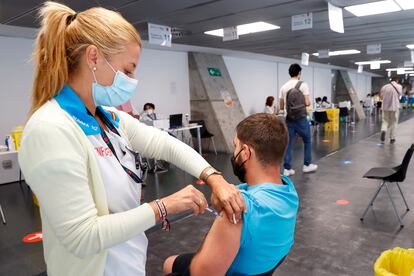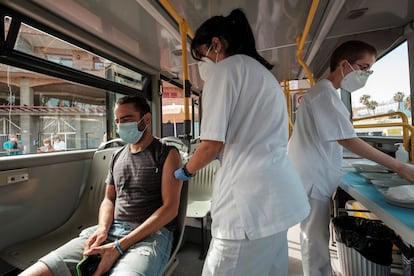Spain about to hit 70% Covid vaccination target despite slower pace
Seven regions have already surpassed this figure, and authorities are now seeking ways to reach stragglers

A total of 70% of the population in Spain is set to be fully vaccinated on Tuesday. This milestone, however, will not be reflected in the data until the Spanish Health Ministry issues its next report on the Covid-19 vaccination drive on Wednesday.
According to the latest figures, updated on Sunday and released on Monday, 32.81 million people – 69.1% of the population – are completely immunized against Covid-19. This means that 427,000 more individuals need to be fully vaccinated to reach the 70% target, which is the equivalent of 33.24 million people. Barring any changes to the data records or a sudden fall in the immunization drive, Spain will achieve this goal on Tuesday.
Prime Minister Pedro Sánchez announced back in April that 70% of the population would be fully vaccinated by August 18, but as this deadline approached, the rate of the immunization drive slowed as many people left for summer vacations and the available pool of potential recipients shrank.

Despite this slowdown, seven regions – Andalusia, Aragón, Asturias, Castilla y León, Extremadura, Galicia and the Basque Country – have already completely immunized more than 70% of their regional populations.
This advance can be attributed to two factors. Firstly, a review of data in Andalusia revealed that 10 days ago nearly 300,000 doses had been recorded as the first dose of the Pfizer-BioNTech vaccine, when in fact only one shot was needed for this group as they had recently recovered from the coronavirus. With the exception of the Janssen vaccine, all the vaccines approved for use in Spain – Pfizer, Moderna and AstraZeneca-Oxford – require two shots. If however, a person under the age of 55 has recovered from the virus in the last six months, only one dose is required, as they still have antibodies.
Another factor that has accelerated the drive is the decision by the regions – which are in charge of the Covid-19 vaccination drive as well as containing the pandemic in their territories – to shorten the time period a person who has recently contracted the virus must wait before receiving a single vaccine dose. This waiting period, previously set at six months, was cut back to between two months and four weeks, depending on the region.
A total of 76.6% of the population has had one dose of a Covid-19 vaccine. If this is added to the 11% of under-12s, for whom no vaccine has been approved, and the 1% of individuals who have recovered from the virus and must wait for their shot, that leaves just 12% of the population who can still be vaccinated.
“It’s a small percentage, but it is a lot of people in absolute terms,” said Antoni Trilla, the head of preventive medicine at Clínic Hospital in Barcelona, indicating that it is equal to around 5.5 million people.
Some 427,000 more individuals need to be fully vaccinated to reach the 70% target, which is the equivalent of 33.24 million people
This figure is likely to fall in the coming weeks given the high participation rate among the under-30s, in particular teenagers. But in other age groups, the vaccination drive has stalled. In the 60-69 population, around 105,000 people (2% of the total) have not received a single vaccine dose, while in the 50-59 bracket, more than 400,000 are unvaccinated. This is of concern to health authorities as both age groups have registered a high number of serious cases and deaths.
In the 40-49 age group, the vaccination drive is also progressing slowly. Just 50,000 people received their first dose between August 20 and 27, and more than a million have not had a single shot, more than 13% of the total. Meanwhile, in the 30-39 population, around 1.5 million people are unvaccinated. In this case, however, the drive is advancing at a faster speed with 100,000 first doses administered last week.
With respect to the under-30s, 70% have had one dose of a Covid-19 vaccine. The speed of the drive, however, is slowing among the 20-29 population. It is important to note that this age group has been hardest hit by the fifth wave of the coronavirus, meaning many who have recovered from the virus must still wait before they can get vaccinated.
Amós García, the president of the Spanish Vaccinology Association (AEV), believes those who have still not been vaccinated do not fall into a single category. “There are those who refuse vaccines, those who continue to have doubts, the apathetics who have no interest and may act out of selfishness, trusting that others will get vaccinated, and people who are difficult to reach because they have no contact with the health system,” he explained.
In addition to these groups, there are those who are advised against getting vaccinated as they may experience a serious allergic reaction, although all sources claim this is a very small collective that represents less than 1% of the population. According to experts, people who still have concerns about the safety of the vaccines and the “apathetics” account for the largest number of the unvaccinated.
Spain’s regions have launched a series of measures to increase the speed of the vaccination drive: Galicia has introduced self-appointment system for the under-20s, the Basque Country has sent out 225,000 messages to remind people to get their second dose, Andalusia has maintained 100 appointment-free vaccination sites and Madrid has opened centers to deliver first shots without a prior appointment.
Latest figures
In the latest Health Ministry report released on Monday, Spain recorded 15,486 new coronavirus cases and added 146 deaths to the official toll, which now stands at 84,146. These figures, which cover the weekend, do not include data from Cantabria and Castilla y León, which did not update their information. The 14-day cumulative number of cases per 100,000 inhabitants fell 22 points to 242. Extremadura continues to have the highest incidence rate, with 478 cases, followed by Cantabria (329) and La Rioja (320).
A total of 7,114 people are currently in hospital with Covid-19, 92 fewer than Friday. Of every 100 patients in intensive care units (ICUs), 18 have been admitted for Covid-19.
English version by Melissa Kitson.
Tu suscripción se está usando en otro dispositivo
¿Quieres añadir otro usuario a tu suscripción?
Si continúas leyendo en este dispositivo, no se podrá leer en el otro.
FlechaTu suscripción se está usando en otro dispositivo y solo puedes acceder a EL PAÍS desde un dispositivo a la vez.
Si quieres compartir tu cuenta, cambia tu suscripción a la modalidad Premium, así podrás añadir otro usuario. Cada uno accederá con su propia cuenta de email, lo que os permitirá personalizar vuestra experiencia en EL PAÍS.
¿Tienes una suscripción de empresa? Accede aquí para contratar más cuentas.
En el caso de no saber quién está usando tu cuenta, te recomendamos cambiar tu contraseña aquí.
Si decides continuar compartiendo tu cuenta, este mensaje se mostrará en tu dispositivo y en el de la otra persona que está usando tu cuenta de forma indefinida, afectando a tu experiencia de lectura. Puedes consultar aquí los términos y condiciones de la suscripción digital.









































